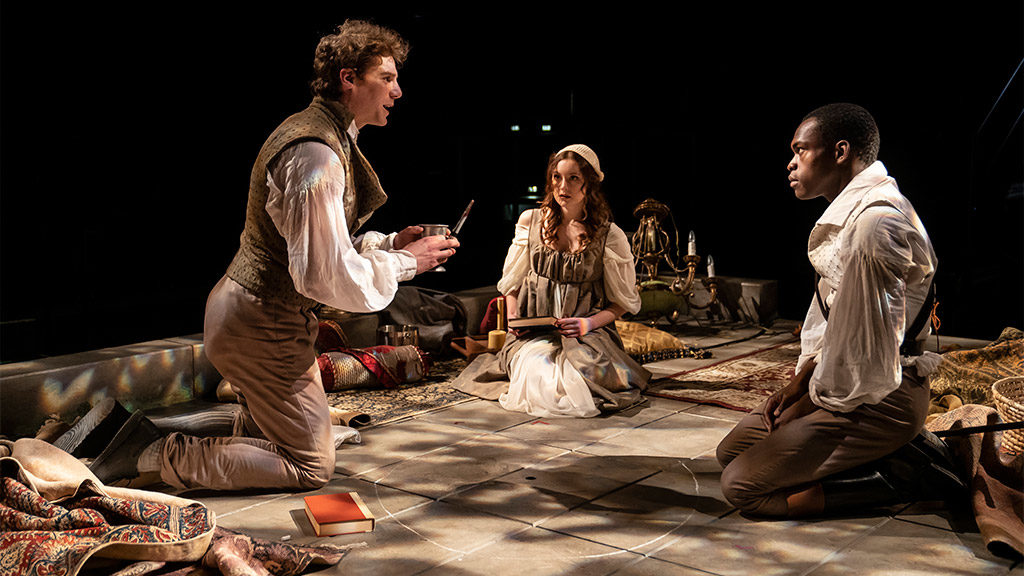
Bad weather in Switzerland. Stuck indoors, a group of talented friends decide to write scary stories.
What a wild crowd they were. Mary Shelley (Cordelia Dewdney), then seventeen years old, who ran off with England’s famous poet, Percy Bysshe Shelley (Walter Briggs)—leaving behind his pregnant wife. Joining them was his pal, notorious womanizer and great poet Lord Byron (Keith D. Gallagher) who also left behind his wife and his half sister with whom he would incestuously father a daughter— plus Byron’s pregnant mistress Claire Clairmont (Amanda Raquel Martinez) and hanger-on, Dr. Polidori (Debo Balogun).
Mary Shelley said that her novel, which has become one of the central myths of our culture, “would speak to the mysterious fears of our nature.” And, as a true test of its status as a “central myth” it, like the Monster, won’t die. It is a brilliant, multi-valent work, still thrilling to read.
But if you haven’t read it, and don’t know the biography, the Lookingglass Theatre Company’s production of Mary Shelley’s Frankenstein, might not make much sense. You can go for the spectacular theatricality—a literal chase scene as Frankenstein and the Monster pursue each other through the theater, lots of blood, circus acrobatics, fabulous lighting effects (William C. Kirkham’s lightning is terrific)—but if you want a good juicy story and heartbreaking sympathy for the Monster, you might be disappointed.
David Catlin, who wrote and adapted the novel, seems, ironically, to suffer from the overreaching ambition Dr. Frankenstein suffers from: Catlin tries to stuff so much into his script that he loses the power of the original, confuses us by adding a fourth narrator to the three the novel supplies, and virtually ignores one of the main and most relevant themes of the book: the dangers of science. Victor Frankenstein wants to save mankind and so usurps the natural and the divine rights to create life. (Do I need to note the obvious: cloning? Artificial Intelligence? Etc?)
The feminist issue is expectably forefront (also obvious). How would a teenage girl not feel she had been “patched and sewn together” by her famous “progenitors”? Her mother, Mary Wollstonecraft, a world famous feminist, her father, William Godwin, a world famous philosopher, and her husband, a world famous poet. The “monster” they created created went on to create a world famous monster in Frankenstein. While she was still quite young, the book had been translated into twenty-nine languages, as the novel, too, took on a life of its own.
Catlin as director pulls out all the stops, and his daring and enormously capable cast provide amply. He gives us great stage images: the Leonardo “Vetruvian Man” and the Fusli “Nightmare,” both bolstering his emphasis on the show’s visual Gothic resonance but neglecting the marvelous and profound story.
[McCarter Theatre Center, 91 University Place, Princeton, NJ] October 15–November 3, 2019; mccarter.org
